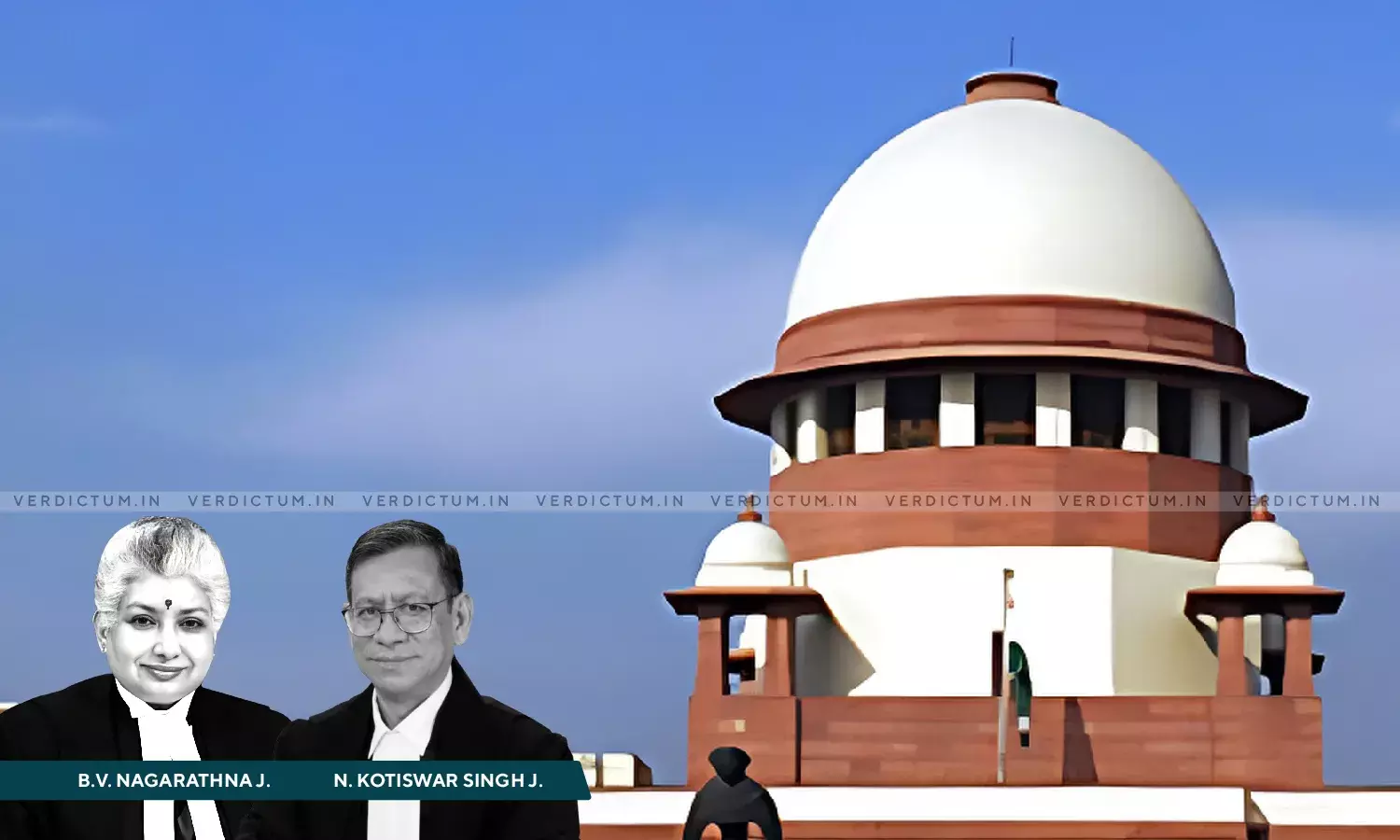Supreme Court Acquits Man Of Murder Charges; Reiterates 'Sukhram' Judgment On Conviction Under Common Intention
The Supreme Court acquitted a man of murder charges reaffirming principles laid down in Sukhram vs. State of M.P. [1989 Supp (1) SCC 214].
The Bench of Justice BV Nagarathna and Justice Nongeikapam Kotiswar Singh held that the appellant’s conviction under Section 302 read with Section 34 could not be sustained solely against him when all co-accused had been acquitted, directing his release upon fulfillment of minor conditions.
"Applying the aforesaid judgment to the present case, we find that when the substantive offence under Section 302 read with Section 34 IPC cannot be sustained as against the co-accused, it could not have been sustained only as against accused No. 1, the appellant herein. This is because the offence under Section 302 IPC was not attributed to the appellant individually and independent of other co-accused. The High Court has lost sight of the said fact. It is also necessary to note that the State has not filed any appeal as against the acquittal of accused Nos. 2 to 4," the Bench said.
The Court noted, "The appellant herein had hit her ear with his hand, but she also stated that one of the accused was holding Gupti in his hand, but she could not tell which accused had held which weapon. Therefore, there is no concrete evidence attributing any overt act, particularly against the appellant herein; as already noted, there is no independent substantive charge vis-à-vis the appellant herein under Section 302 of the IPC. It is only along with the other accused, i.e., Section 302 read with Section 34 IPC."
The Court passed the order in an appeal against the High Court of Chhattisgarh’s Judgment and concluded that there was insufficient independent evidence for Tandi’s sole conviction under Section 302 when his co-accused were acquitted of the same offense.
"We find that the High Court was not right in dismissing the appeal filed by the appellant herein and convicting him under Section 302 read with Section 34 IPC. Therefore, the appellant is also acquitted of the said charges for the offences against him," the Bench held.
The case stems from an incident on March 7, 2015, in Raipur, Chhattisgarh, where Tandi, alongside three co-accused—Rajesh Kshatri, Kundan Kumar Sharma, and Trinath Baghel—allegedly attacked Tarachand Nayak with a sword and wooden stick over a prior dispute, causing fatal injuries. Tarachand's wife, Pinky Nayak, who attempted to intervene, was allegedly slapped by Tandi. Following the incident, an FIR was lodged at the Saraswati Nagar Police Station, leading to the arrest and subsequent charges against all four accused.
The trial was conducted by the Fourth Additional Sessions Judge, Raipur, who convicted all four accused under Sections 302 read with 34 IPC and sentenced them to life imprisonment. Additionally, Tandi was sentenced to three months’ rigorous imprisonment under Section 323 IPC, while accused Kundan Kumar Sharma faced further charges under Sections 25 and 27 of the Arms Act.
Upon Appeal, the High Court upheld Tandi's conviction but acquitted the three co-accused on December 5, 2023, asserting insufficient evidence for their involvement. Dissatisfied, Tandi appealed to the Apex Court, challenging his sole conviction under Section 302 read with 34 IPC in the absence of his co-accused.
AoR Abhijeet Shrivastava, appearing for Tandi, contended that his conviction solely under Section 302 read with Section 34 IPC could not be sustained since the same charges were acquitted for the other accused. He argued that, in line with the principle outlined in the Supreme Court judgment in Sukhram v. State of M.P. (1989), a conviction based on common intention under Section 34 IPC could not stand when all co-accused are acquitted of the same offense.
During the hearing, AAG Avdhesh Kumar Singh appeared for the respondent- State.
The Court reviewed the evidence, highlighting gaps in the prosecution’s case. Testimony from eyewitnesses did not definitively link Tandi to a lethal act against the deceased, nor did it establish which accused wielded specific weapons. In light of this lack of individual attribution and the absence of an independent charge of murder against Tandi, the Court found it legally unsound to uphold his sole conviction under Section 302 read with 34 IPC.
"As far as the conviction under Section 323 IPC is concerned, the Sessions Court had ordered rigorous imprisonment of three months plus fine of Rs.500/-. It is stated at the bar that the appellant has completed nine and a half years of imprisonment. If the fine of Rs.500/- is also paid, the appellant shall be released from imprisonment. If the fine has not yet been paid, the said fine shall be paid prior to the release of the appellant. The appeal is allowed and disposed of in the aforesaid terms," the Bench ordered.
Cause Title: Rajesh Tandi v. The State of Chattisgarh [Special Leave to Appeal (Crl.) No(s). 7609/2024]
Appearance:-
Petitioner: Advocates Abhishek Vikas, Abhijeet Shrivastava (AOR), Anshuman Shrivastava, Ieeshan Sharma, Rhe Rao
Respondent: AAG Avdhesh Kumar Singh, Advocates Prerna Dhall, Piyush Yadav, Akanksha Singh, Prashant Singh (AoR)
Click here to read/download the Order




